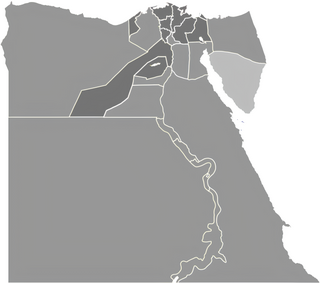
Parliamentary elections were held in Egypt from 28 November 2011 to 11 January 2012, following the revolution that ousted President Hosni Mubarak, after which the Supreme Council of the Armed Forces (SCAF) dissolved Parliament. However the dissolution was ruled unconstitutional and Parliament was reinstated. Originally, the elections had been scheduled to be held in September 2011, but were postponed amid concerns that established parties would gain undue advantage.

The Free Egyptians Party is an Egyptian liberal party, founded after the 2011 Egyptian revolution. It supports the principles of a liberal, democratic, and secular political order in Egypt. The Free Egyptians Party was the largest party in the House of Representatives. The party is a founding member of Al Hurriya Liberal Network.

The Dignity Party is an Egyptian left-wing Nasserist political party founded in 1996 by Amin Iskander and Hamdeen Sabahi.

The Strong Egypt Party is an Egyptian centrist political party founded in 2012 by former presidential candidate Abdel Moneim Aboul Fotouh.

The Anti-Coup Alliance is a coalition in Egypt formed to reverse the ouster of former president Mohamed Morsi. The coalition is made up of approximately 40 Islamist parties and groups.

Presidential elections were held in Egypt between 26 and 28 May 2014. There were only two candidates, former Egyptian defence minister Abdel Fattah el-Sisi and Egyptian Popular Current candidate Hamdeen Sabahi. El-Sisi won the election in a landslide victory, having received 97% of votes.

A constitutional referendum was held in Egypt on 14 and 15 January 2014, with Egyptians abroad voting between 8 and 12 January. The new constitution was approved by 98.1% of voters. Turnout was 38.6%.
The Egyptian Wafd Alliance was an alliance of political parties that would have run in the 2015 Egyptian parliamentary election. The Egyptian Social Democratic Party left the alliance and will run independently. The Tagammu Party left the Wafd Alliance and will run for individual seats. The Justice Party announced on 15 February 2015 that it will not participate in the election. The New Wafd Party, Conservative Party and Reform and Development Party joined the For the Love of Egypt alliance.
The Egyptian Front is an alliance of political parties contesting the 2015 Egyptian parliamentary election in a joint list with the Independent Current Coalition, called Egypt.
The 25-30 Alliance is an alliance of independents created to run in the 2015 Egyptian parliamentary election of 17 October to 2 December 2015.
The Reawakening of Egypt, also translated Egypt's Renaissance, is an electoral alliance in Egypt that was established by Abdelgelil Mostafa to contest the 2015 Egyptian parliamentary election. It had candidates in the race, but later withdrew them.

For the Love of Egypt is a political alliance created by the General Intelligence Service. FLE contested the 2015 Egyptian parliamentary election.

The Nation's Future Party, also known as the Future of the Nation Party or Mostaqbal Watan, is an Egyptian political party. The party is often seen as a "party of power", created for the sole purpose of backing President Abdel Fattah el-Sisi and his policies.

Ali Abdel Aal Sayyed Ahmed is an Egyptian law professor and politician. He was Speaker of the House of Representatives between 10 January 2016 and 12 January 2021. As law professor he worked at Ain Shams University and specialized in constitutional law.

Presidential elections were held in Egypt between 26 and 28 March 2018, though Egyptians abroad voted from 16 to 18 March 2018. On 19 January, incumbent President Abdel Fattah el-Sisi formally announced he would run for a second and final term. El-Sisi won the election with 97%, according to the official results. A runoff would have taken place 19 to 21 April outside the country and 24 to 26 April within the country if no candidate had reached 50% of the vote. The election had a turnout of roughly 41%, lower than the 2014 election's 47%. A 2019 constitutional change allowed El-Sisi to remain in power until 2030 instead of 2022.

Parliamentary elections were held in Egypt on 24–25 October and 7–8 November 2020 to elect the House of Representatives. The election resulted in a landslide victory for the Nation's Future Party, winning 316 of the 596 seats.

Ahmed Mohamed Ramadan Tantawi known as Ahmed Tantawi also: Al-Tantawy is an Egyptian politician and journalist. As of July 2022, he was the former head of the Dignity Party and a former member of the Egyptian House of Representatives. In 2023, Tantawi announced his potential candidacy for the 2023 Egyptian presidential election but repressive tactics, including retaliatory detentions of his family members supporters and campaign members, prevented his campaign from collecting the 25,000 voters’ endorsements required to officially file his candidacy.

General elections were held in Jordan on 10 November 2020 to elect the members of the nineteenth House of Representatives. Voter turnout was just 29.88%, the lowest in a decade.

Presidential elections were held in Egypt in December 2023, as announced by the National Election Authority, after speculation that the elections might be held earlier than expected. Candidate registration was from 5–14 October 2023 and the election was held in Egypt from 10 to 12 December; expatriates voted from 1–3 December.

















